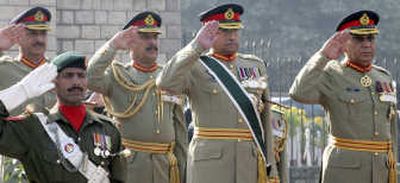Musharraf gives up military role

ISLAMABAD, Pakistan – President Pervez Musharraf today formally relinquished his position as military chief of staff, a role that for more than eight years defined him as Pakistan’s leader but that ultimately led to a popular uprising that threatened to drive him from power.
Under pressure from international backers and domestic foes, Musharraf acquiesced to demands that he retire from the military if he wishes to continue serving as president.
In a solemn ceremony at a stadium near military headquarters in Rawalpindi, a garrison city adjacent to the capital, the general handed over command to Gen. Ashfaq Kiani, a longtime loyalist. As the nation watched on live television, Musharraf, standing stiffly at attention in a full dress uniform, presented Kiani with the commander’s baton, and the two shook hands.
Because the country is under de facto martial law, Musharraf still will yield extraordinary powers, even once he takes the oath of office as a civilian president Thursday, as he has vowed to do. Nonetheless, it represents a humbling moment for a leader who until now, despite a popular uprising against him, had refused to accept curbs on his rule.
“All this is significant because it signals his serious understanding of what a predicament he’s in,” said Patrick Cronin, an analyst at the International Institute for Strategic Studies. “It shows that if he wants to cling to power, he has to take actions he hasn’t been willing to take in the past.”
Even without his uniform, the emergency provisions Musharraf put in place Nov. 3 continue to give him sweeping powers to muzzle dissent, although recent days have seen an easing of the harsh measures imposed when he declared emergency rule. The general suspended the constitution, imposed curbs on the media, arrested thousands of opponents and in effect dismantled the independent judiciary.
Musharraf’s move to give up his post as military chief could help defuse political tensions in Pakistan, which is considered a crucial U.S. ally in the fight against al-Qaida and the Taliban.
But his decision to give up military leadership leaves unanswered, for the moment, crucial questions about his future dealings with opposition politicians and how and whether the country will move toward civilian rule.
Musharraf, 64, refused to leave the army until his new incarnation as a civilian leader was assured. Pakistan’s Supreme Court, now made up of loyalists who were installed under emergency rule, last week threw out the remaining legal challenges to his reelection to a new five-year term as president.
Musharraf has been head of the army since 1998, a year before he ousted then-Prime Minister Nawaz Sharif, now a newly minted opposition leader, in a coup. He later became president, a dual role that was challenged in earnest earlier this year by pro-democracy activists.